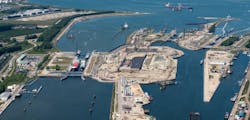Technip Energies and GE Vernova Advance UK Net-Zero Transition with Carbon Capture Project at NZT Power
Technip Energies, the leader of a consortium with GE Vernova, and its construction partner Balfour Beatty received a Letter of Intent from bp on behalf of NZT Power Limited for the execution phase of the Net Zero Teesside Power (NZT Power) project in the UK.
The project is expected to become one of the first commercial-scale gas-fired power stations featuring carbon capture. The system is projected to capture up to 2 million tons of CO2 per year and provide flexible, dispatchable, low-carbon power equivalent to the average electricity requirements of 1.3 million UK homes.
The project is an important part of the Carbon Capture, Usage, and Storage (CCUS) East Coast Cluster and has been selected for government funding support as part of the UK's net-zero program. The selection is followed by the Development Consent Order granted by the Secretary of State for the Department for Energy Security and Net Zero.
The consortium will construct a combined cycle plant powered by a GE Vernova 9HA.02 gas turbine, a steam turbine, a generator, and a Heat Recovery Steam Generator (HSRG). The HRSG will integrate with a carbon capture plant using Technip Energies’ Canopy by T.ENTM solution powered by the Shell CANSOLV CO2 capture technology.
Technip Energies, GE Vernova, and Balfour Beatty, supported by Shell in the UK, will also form the Carbon Capture Alliance (CCA). The alliance is committed to long-term investment in the UK, with members having a significant UK footprint and a mature UK supply chain.
According to a UK government analysis, 10 GW of CCUS power will be required to decarbonize the UK power sector by 2035 (10 GW is around 10% of the total UK electricity system).
“GE Vernova will help bring proven expertise in natural gas combined cycle plant engineering, operability, and full-scale integration to support carbon abatement for this project,” said Mavi Zingoni, CEO of Power at GE Vernova. “We believe post-combustion carbon capture can play a crucial role in reducing emissions and ensuring dispatchable power in the future.”





